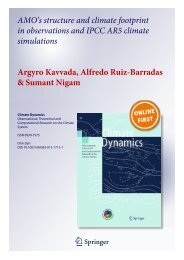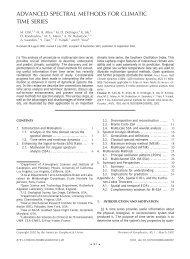chapter - Atmospheric and Oceanic Science
chapter - Atmospheric and Oceanic Science
chapter - Atmospheric and Oceanic Science
You also want an ePaper? Increase the reach of your titles
YUMPU automatically turns print PDFs into web optimized ePapers that Google loves.
Global climatic change<br />
at a global scale, they show notable differences at a regional scale, particularly in<br />
the simulations of the current fields of rainfall <strong>and</strong> of their future prediction. This<br />
is an important limiting factor at the moment of evaluating the impacts of the climatic<br />
change.<br />
This is in turn also a great limitation to estimate the vulnerability to the climatic<br />
change, since it is to be expected that most of the ecological, economic <strong>and</strong><br />
social impacts will be at regional or local scale. However, the models are consistent<br />
in the prediction of some aspects that, though of global character, will emerge in<br />
many regions. For example, an increase of the intensity of the hydrologic cycle is<br />
expected with more intense rainfalls, though in some regions the opposite could<br />
happen. It is estimated that there will be a major frequency <strong>and</strong> intensity of the<br />
intense precipitations (IPCC 2001b) <strong>and</strong> in consequence of the phenomena associated<br />
with them, what is already happening in several regions of the planet. In <strong>chapter</strong><br />
5 it has been seen that it is already occurring in the La Plata basin.<br />
As a consequence of the oceans thermal expansion <strong>and</strong> to a lower degree due<br />
to the melting of glaciers <strong>and</strong> continental mantles of ice, it is estimated that the<br />
mean sea level will increase. As a result, by the 2100 it would be about 60 cm over<br />
its current level. This global effect will be felt with few variants on all the coasts of<br />
the planet, but severe problems can be anticipated in those relatively low as it is the<br />
case of the deltas <strong>and</strong> estuaries <strong>and</strong> in the insular states of the Caribbean <strong>and</strong><br />
Polynesia, causing huge socioeconomic losses <strong>and</strong> migrations.<br />
Another global impact that will display uniformly at regional scale is the fertilization<br />
of a great part of the biosphere with the consequent ecological change.<br />
Part of the vegetation has a type of photosynthesis in which the carbon dioxide is a<br />
limiting factor, thus, CO2 increase favours its growth. Other vegetables, on the other<br />
h<strong>and</strong>, do not change their level of photosynthesis depending on the concentration<br />
of the carbon dioxide. The augment of the concentration of this gas can alter the<br />
ecological balance favouring the expansion of the first type of vegetables at the<br />
expense of the second one. Much more serious will be the effects of the regional<br />
climatic changes on the ecosystems. These can turn out to be very critical in the isolated<br />
systems such as mountains or marshl<strong>and</strong>s where it might come to the massive<br />
extinction of many species <strong>and</strong> ecosystems. Something similar would happen with<br />
almost all the ecological systems since the human use of the space has led to their<br />
fragmentation <strong>and</strong> isolation.<br />
Some studies suggest that even in the cases in which the continuity of the<br />
ecosystems is not geographically limited, the speed of the climatic change would<br />
be two or three times greater to the one at which many species could displace.<br />
Because of that, it is growing the idea that if a drastic GHG emission reduction <strong>and</strong><br />
their elimination do not take place within the next 50 years, the ecological catastrophe<br />
to come will not have precedents since the mankind appeared in the planet.<br />
124






